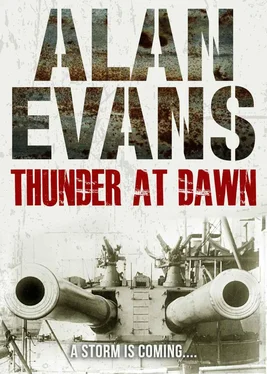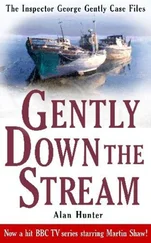A look-out shouted, “Ship bearing green four-oh.” There was a rumble as the guns trained around and the searchlights on the wings of the bridge and up in the tops twisted in their mountings. They crackled into life, their beams stabbed out across the dark sea to light up the target on which the guns were lined. They lit up Thunder’s forty-foot steam pinnace with its stubby funnel, young Midshipman Manton at the wheel. Buckley, Mantor’s leading hand, lifted one arm, waving, the pinnace spun away into the sheltering dark, the searchlights snapped out. The exercise went on.
The exercises were almost a nightly event. Smith had started them as soon as he joined Thunder so they called them Smith’s game and referred to him as the Bat. They groused about the exercises as a matter of principle but secretly found the game a break in the deadly routine of work and drills. They had become expert.
Smith stood aloof on the bridge, his face grim. He had reason. He had come to Thunder certain that he was banished, his career virtually at an end. He had known other officers who had faded into obscurity after some minor scandal ashore. He joined her at Esquimalt in British Columbia where she had just had a refit. In the first hour, through a chance-heard conversation he learned his reputation had preceded him: he was a pacifist, his nerve gone; his affairs were the scandal of London and the Grand Fleet. He knew the crew were wary of him and pride would not let him explain.
He could have said that a drunken armchair tactician had been critical of the Navy’s inability to destroy an enemy who refused to come out to be destroyed. Smith had boiled over and replied that he had seen enough men killed at Jutland and that if the rest of the country were like the drunk the Navy would do well to stay at home. The story had been repeated but not the words in italics. He would not explain that and he could not explain the women.
But he had been in the Navy since he was twelve and lonely often enough. As a cadet at Britannia he had been an outsider, accepted but different. An orphan brought up by a retired Chief Petty Officer and his wife, his home a village shop; he had been different enough. They wondered how he had got into Britannia and so did Smith. Before he was old enough to try to find out the C.P.O. and his wife were dead and the Navy was his home and his family. But he wondered still.
Now he paced restlessly out to the wing of the bridge, aware of them watching him and stared out at Thunder’s shadowy bulk. He had found a ship run by Garrick, the First Lieutenant because the Captain, embittered at his backwater command, kept to his cabin and his gin. He looked now at that bulk, impressive in the darkness with the bristling guns and thought it was as well this man of war was a ship of peace. The nearest enemy was ten thousand miles away.
Thunder was a four-funnelled armoured cruiser of twelve thousand tons. She had served on the Pacific seaboard, based at Esquimalt and cruising off the coast of South America, for two-and-a-half years since the outbreak of war, the sole representative of a Navy stretched thin by the concentration in European waters. Before the war she had been a unit of the Third Fleet, which meant she was laid up with a tiny caretaker crew. Her crew admitted the dockyard at Esquimalt sent her back to sea as nearly new as hard work and ingenuity could contrive, but it was only a relative term.
She was too old. Laid down when Victoria reigned, her designed speed had been lower than the later more modern cruisers and it was doubtful if she could attain that speed now, let alone maintain it for any length of time. Davies, her Chief Engineer, Lieutenant-Commander R.N.R. and recalled from the Merchant Service, swore that she could. But he always evaded putting it to the test and nobody believed him. She was slow. So on the mess-decks they said, “Had to call her Thunder , didn’t they? ’Cause it’s a bleeding certainty you couldn’t call her Lightning !”
Joke.
She had been built with some abortive idea of using her in the rivers and shallows of the China Station. It came to naught, but thus designed to cruise in shallow waters, in any kind of sea she was an uncomfortable ship. So they said, “Called her Thunder ’cause she’s one long roll!”
Joke.
Plenty of jokes. In the wardroom that first night Aitkyne, the navigator, tall and elegant and watchful said, “We wondered if you’d arrive in time for resurrection day, sir.”
Smith, sweating coldly and stomach rebelling on what was also the first night at sea, clutching a glass of sherry he wanted like the plague, asked blankly, “Resurrection day?”
“Bringing the old girl back to life again, sir. Taking her to sea.” Laughter. Then Aitkyne added, “If she was a house, you’d expect to find bats and ghosts.”
Smith replied, “One carries one’s own ghosts around.” And told himself he had still to learn to keep his mouth shut. He had spoiled the joke and they looked at him oddly. The spectre at the feast, or rather the party. It was a party given to welcome Smith aboard but he had sensed the self-consciousness behind that welcome and knew the cause. They were all wary of him and that was a pity because he liked the look of them.
And Thunder’s wardroom was comfortable with a long table at which the officers ate, two sideboards, easy chairs, carpet on the deck and even a piano and a gramophone, though the last belonged to young Wakely, one of the midshipmen, and had been borrowed from the gunroom for the occasion. After two-and-a-half uneventful years on that station it was hardly surprising that they had discarded the spartan surroundings familiar to the Grand Fleet. Any fool could be uncomfortable.
But on the surface they made Smith welcome. A new face in the wardroom, a new face aboard Thunder , was an event. Her crew had served in her since the war started. The midshipmen had joined her not long ago as fifteen-year-old cadets to fill the gaps created by aging officers invalided out and one lost at sea in a gale. A score of young seamen and boys had accompanied the cadets. That had been Thunder’s first and only draft.
The crew of the fore-turret was a fair sample of Thunder’s crew, which consisted largely of reservists with that sprinkling of young seamen and boys. Farmer Bates was a grandfather, one of seven aboard. Gibb at seventeen was far and away the youngest in the turret but he had settled in. Thunder’s slowness and rolling, her old guns and short-handed crew did not worry him because she was his ship. His first ship. And because here in these waters those things did not matter anyway.
Thunder carried a 9.2-inch gun in a turret forward and another aft. Of her twelve six-inch guns, in casemates like armoured steel pods bulging out from her hull, four were on the upper deck, one at each corner so to speak. The other eight were on the main deck below, four to a side. The guns were elderly and it was a notorious fact that in her class of ship the eight guns on the main deck could not be fired in bad weather because opening their ports would let in the sea. That did not matter in the case of Thunder because she sailed with a reduced complement. That is to say that, as she was not expected to fight in a Fleet action nor anything like it, she was not manned for the purpose. Half her crew of 600 were engineers or stokers because at her most economical speed she burned 100 tons of coal a day, every piece of which had to be shovelled from bunkers to fires. There were barely enough gunners for the turrets and the four upper deck six-inch.
Garrick was Gunnery Officer. The ship had engaged in practice firing shortly after leaving Esquimalt and the gunnery had been startlingly good, but Garrick was a gunnery fanatic and had trained and drilled these men for two-and-a-half years. The men were all right, but there weren’t enough of them and the ship and her guns were too old.
Читать дальше












